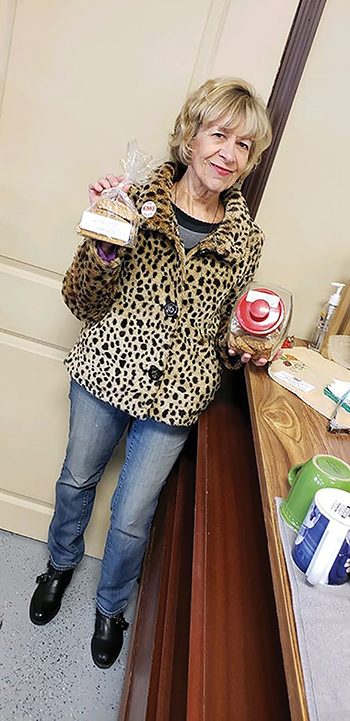Oral Cancer Survivor
Tough Cookie Attitude Defeats Cancer
 Nancy Wasen is a rock ‘n’ roll mega-fan, lover of adventure and self-described tough cookie who hasn’t crumbled despite some considerable life challenges. Her biggest challenge and wooliest adventure to date is surviving Stage IV oral cancer of the tongue.
Nancy Wasen is a rock ‘n’ roll mega-fan, lover of adventure and self-described tough cookie who hasn’t crumbled despite some considerable life challenges. Her biggest challenge and wooliest adventure to date is surviving Stage IV oral cancer of the tongue.
Revisiting my old cancer journal and reflecting on those experiences sometimes feels surreal, and I think, “Did this really happen to me?” But it did happen — and I never hesitate to share my story when it might help someone.
I’d felt poorly all summer in 2010 as my primary care doctor misdiagnosed me with various minor ailments before I was finally referred to an ENT. Almost immediately, he spotted what he described as a huge mass at the base of my tongue and suspected advanced cancer. I’d love to brag about how bravely I accepted such devastating news, but the truth is I left his office in a daze, found my car and sobbed curled up on the seat until I couldn’t cry anymore.
Once the initial shock passed, my inner tough cookie set me straight about my cancer diagnosis and the road ahead. Undergoing treatment for end-stage cancer and getting through recovery would likely be a lengthy, complex process, and I’d have no family to rely on for help or support. I was the only child of now long-deceased parents, divorced, with a daughter living elsewhere. It was just me and my warped sense of humor, Murray, my dog and the two cats — and this *&@#! cancer. I desperately needed a plan.
So I got busy. First I made sure my personal and financial affairs were in order. After that, I’d been strongly advised to establish care with oncologists who treat my kind of cancer every day, no matter how far I had to go. After some research I headed to a university hospital a couple of hours away. I firmly believe this advice saved my life.
The cancer center was 165 miles roundtrip, with radiation therapy scheduled five days a week for seven weeks concurrently with weekly chemotherapy. Driving myself would be troublesome, to say the least. I reached out, emailing everyone I knew. Dear friends who lived near the cancer center insisted I move in with them during my seven weeks of treatment. Other friends rallied around me in amazing ways, watching my house, offering temporary homes for my pets, doing chores and errands, loaning me a laptop to stay in touch and showering me with calls, emails, letters, visits and even gifts of money.
Encased in a radiation mask that was bolted to a table, I repeated my mantra through 35 sessions: “This is where I need to be.” Some patients dread the mask, but I envisioned mine as my shield of protection. For years afterward, it hung on my wall above a sign that read, THANK YOU FOR NOT SMOKING.
Treatment was no picnic, to be honest. Music was my solace, so even at my worst, I went out with friends to hear rock ‘n’ roll. It was like medicine for my soul.
My toughest time wasn’t treatment, though, but afterward. I returned to my empty house right before Christmas in the dreary cold, feeling worn down and alone.
I still had the feeding tube they’d put in my stomach after I lost 30 pounds in three weeks from no appetite. Knowing I’d have to wean off of it, I tried some soup my second day home and choked so intensely it really scared me. That’s when I recognized I’d need more help to recover.
To relearn to swallow and regain my ability to eat solid foods, I had months of speech therapy, did jaw exercises and had two procedures to stretch my esophagus. My taste buds woke up little by little over six months, when I was finally able to “cut the cord” on my feeding tube.
All that seems like another lifetime because I’ve been cancer-free for so long now. I lead a full life working part time in catering, paying it forward in my community, running a home-based business baking 40 flavors of biscotti and taking in 70+ rock ‘n’ roll shows a year with dozens of my crazy friends. Life is definitely good.
As you head down this cancer path, I hope you can find your “tough cookie” attitude. If I can, you can, and it’s made all the difference.
Notes from Nancy
- Make a plan.
- Take it one day at a time.
- Seek treatment where your cancer is the norm, even if you travel.
- Bring a friend to take notes at appointments.
- Get a second opinion.
- If you don’t feel good about your doctor, get a new one.
- Keep asking questions.
- Check out support groups locally and online.
- Reach out to friends and acquaintances.
- Ask for and accept help.
- Find what makes you happy and do it.


